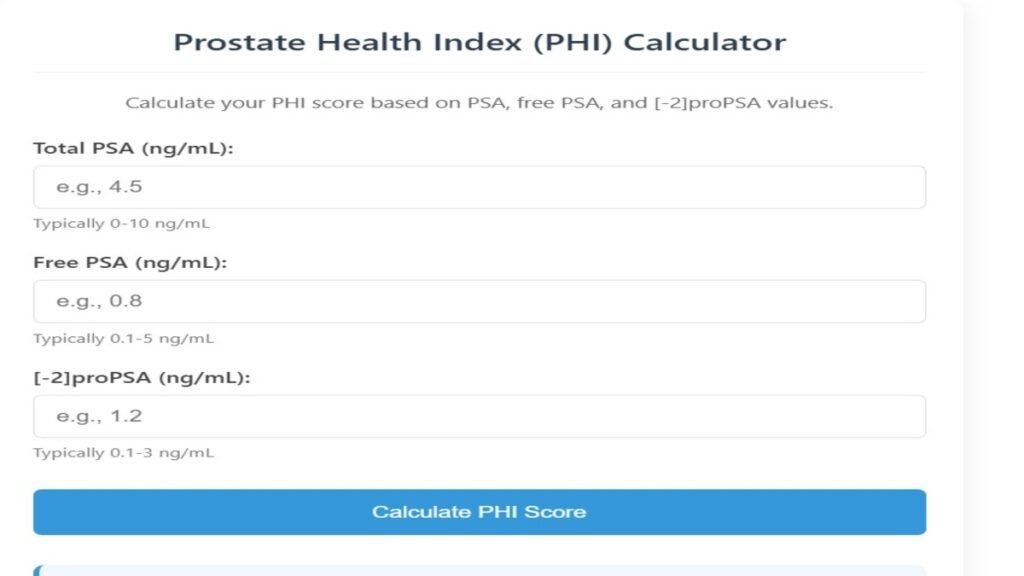Prostate health index Calculator input your PSA, free PSA, and [-2]proPSA values to assess prostate cancer risk. Fast, accurate, and easy to use—no registration required. Get instant results with interpretation to help guide your next steps. A valuable tool for prostate health awareness
Prostate Health Index (PHI) Calculator
Calculate your PHI score based on PSA, free PSA, and [-2]proPSA values.
About the PHI Score
The Prostate Health Index (PHI) combines three blood tests to better assess prostate cancer risk:
- Total PSA
- Free PSA
- [-2]proPSA
PHI = ([-2]proPSA / Free PSA) × √Total PSA
Interpretation: Higher PHI scores indicate greater probability of prostate cancer.
Prostate Health Index Calculator – Free Online Tool for Prostate Cancer Risk Assessment
Introduction
Prostate health index Calculator is an advanced blood test that helps assess the risk of prostate cancer more accurately than traditional PSA testing alone. Our free online PHI calculator allows you to input your lab results (total PSA, free PSA, and [-2]proPSA) to calculate your PHI score instantly. This tool is designed for informational purposes to help men understand their prostate health better and guide discussions with their doctors.
Prostate health index Calculator comprehensive guide, we’ll cover:
- What is the Prostate Health Index (PHI)?
- How the PHI Calculator Works
- Benefits of Using PHI Over Standard PSA Testing
- Step-by-Step Guide to Using the Calculator
- Interpreting Your PHI Score
- Scientific Validation and Accuracy
- Frequently Asked Questions (FAQ)
What is the Prostate Health Index (PHI)?
The Prostate Health Index (PHI) is a mathematical formula that combines three blood test results:
- Total PSA – Measures overall prostate-specific antigen levels.
- Free PSA – The portion of PSA not bound to proteins.
- [-2]proPSA – A more cancer-specific form of PSA.
The formula is:
PHI = ([-2]proPSA / Free PSA) × √Total PSA
PHI provides a more accurate risk assessment for prostate cancer than PSA alone, reducing unnecessary biopsies by up to 30% (studies: Journal of Urology, European Urology).
Why Use Our Free PHI Calculator?
Our online PHI calculator is:
Fast & Easy – Get results in seconds.
No Registration Needed – Completely free with no sign-up.
Accurate & Science-Backed – Based on validated medical research.
Helps Reduce Unnecessary Biopsies – Better risk stratification.
Mobile-Friendly – Works on all devices.
Prostate health index Calculator How to Use the PHI Calculator Guide
1: Enter Your Lab Results
| Input Value | Description | Normal Range |
|---|---|---|
| Total PSA (ng/mL) | Overall PSA level in blood | 0-4 ng/mL (varies by age) |
| Free PSA (ng/mL) | Unbound PSA fraction | 0.1-5 ng/mL |
| [-2]proPSA (ng/mL) | More cancer-specific PSA form | 0.1-3 ng/mL |
2: Click “Calculate PHI”
The calculator instantly computes your score using the PHI formula.
3: Get Your PHI Score & Interpretation
| PHI Score Range | Risk Level | Recommended Action |
|---|---|---|
| < 25 | Low Risk | Routine monitoring, discuss with doctor |
| 25-34.9 | Moderate Risk | Further evaluation (MRI, biopsy if needed) |
| 35-54.9 | High Risk | Urgent urology consultation |
| ≥ 55 | Very High Risk | Immediate medical follow-up |
Scientific Validation: Why PHI is More Reliable Than PSA Alone
Multiple studies confirm that PHI improves prostate cancer detection:
Reduces False Positives – PHI is 2.5x more specific than PSA (NIH study).
Better at Detecting Aggressive Cancer – Helps identify Gleason ≥7 tumors (European Urology).
Fewer Unnecessary Biopsies – Low-PHI patients can often avoid invasive procedures.
Conclusion: Take Control of Your Prostate Health
free PHI calculator helps you assess prostate cancer risk more accurately than PSA alone. By understanding your score, you can make informed decisions with your doctor and avoid unnecessary procedures.
🔹 Try the calculator now – Input your values and get instant results!
🔹 Share with others – Prostate health awareness saves lives.

Frequently Asked Questions (FAQ)
1. What is a normal PHI score?
<25: Low risk (unlikely prostate cancer)
25-35: Moderate risk (further tests may be needed)
>35: High risk (consult a urologist)
2. Can PHI replace a biopsy?
No, but it helps reduce unnecessary biopsies. A high PHI score may prompt further testing (MRI, biopsy).
3. How often should I check my PHI?
If your PSA is elevated, PHI testing can be done every 6-12 months under a doctor’s guidance.
4. Is PHI covered by insurance?
Many insurance plans cover PHI testing if PSA levels are borderline (check with your provider).
